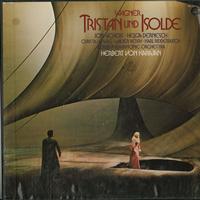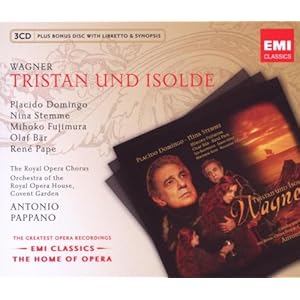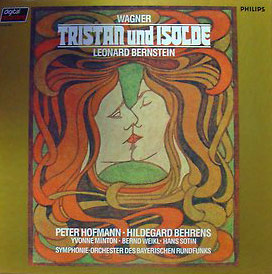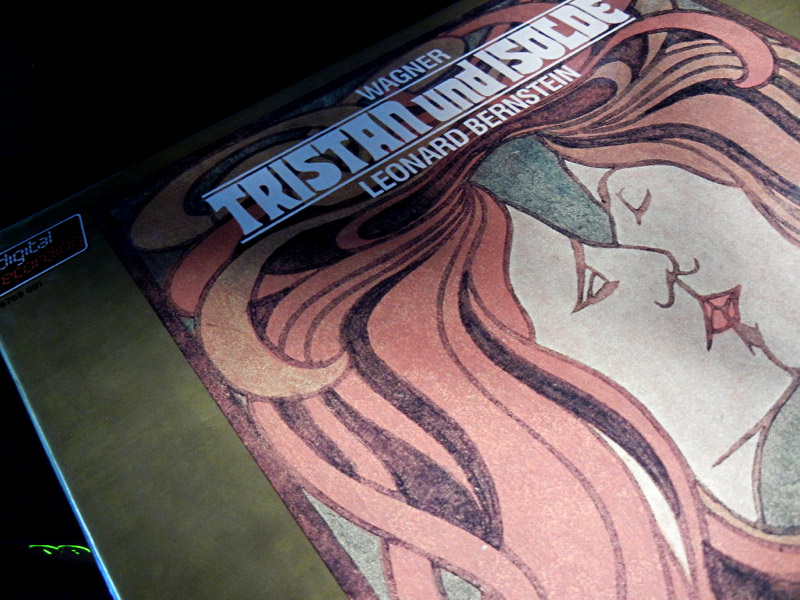Hi all, with the bicentennial of Wagner's birth in 2013, thought it'd be fun to share with you some personal reviews and notes of his operas, which I've gathered over the years. Although I listened to and own many recordings, this is not a complete survey. One opera at a time - and we start with a lengthy one:
Part 1: Tristan und Isolde
Tristan, Wagner's most ambitious and influential opera, is the essence of Schopenhauer set to drama and music. Wagner had become familiar with the work of Schopenhaur and his idea of the world driven by unachievable desires in the mid 1850s, and subsequently started work on an opera devoted entirely to this idea. While working on it, he became involved with Mathilde von Wesendonck, the wife of his then-sponsor (when Wagner's wife found out, this led to one his several exiles). He set five of Mathilde's poems to music, the Wesendonck Lieder, two of which were studies for Tristan and include themes that made it into the Act II love duet and the Act III prelude of the opera. The lead parts of the opera, Tristan (tenor) and Isolde (soprano) are generally regarded to be among the heaviest operatic roles ever written, and have been difficult to cast since the premiere in 1865.
The most famous recording is the 1952 FurtwÄngler - an ambitious and conscious undertaking by Walter Legge to preserve a famous partnership, Ludwig Suthaus, Kirsten Flagstad and Wilhelm Furtwangler. Furt and Legge didn't like one another but set their differences aside. Famously, Legge's wife, Elisabeth Schwarzkopf, dubbed in Isolde's high Cs. It's an unmissable recording, but I have to say despite the very capable voices, they do sound a bit long in the tooth.
In 1966, Philips recorded the Tristan live, but one act at a time, under BÖhm, with Birgit Nilsson and Wolfgang Windgassen. BÖhm is fast in an opera that is supposed to be slow, the singers do a great job although Windgassen sounds overparted at times. It's many people's favorite but for me, it misses the essence.
There are a number of highly regarded live performances under Karajan, but his first and only studio recording for EMI happened in 1972, with Jon Vickers and Helga Dernesch. Sadly not one of Von K.'s most inspired performances, but his singers are hugely impressive and despite Vickers' dodgy German pronunciation, sound idiomatic.
Early 1980s, Carlos Kleiber and Lenny Bernstein committed their readings to disc. Both are controversial. Kleiber was never happy in the studio and apparently became so distressed with René Kollo's Tristan, he ran out before the sessions were complete and never returned to the studio. DG managed to complete the recording from practice takes. The result is quite special, with a Mozartean touch and sensitive singers - but for this reason, very studio bound.
Bernstein did it live, but like BÖhm, one act at a time to give the singers rest between acts. It's the slowest performance ever recorded - the original CD issue consisted of 5 discs. Hildegard Behrens and Peter Hofmann are committed and have nice voices, but a bit small for the parts. All in all, my personal favorite - it's SLOW but intense, and one of Bernstein's supreme achievements.
In 2004, DG released another live performance, under Thielemann. He is good, but his singers aren't memorable. Thomas Moser gives it his best shot, drowns in Act II but is surprisingly good in Act III. Deborah Voigt has a big voice but doesn't really impress at any time.
EMI followed in 2005 with the - for now - most recent studio recording, under Tony Pappano, with Placido Domingo and Nina Stemme. Stemme sounds very good and gives a credible interpretation (she does miss some of the irony in the role, a small thing compared to what is there). Domingo is a big surprise, despite the fact that he was in his 60s at the time of the recording, he sounds very good and up to the task (helped by the engineers, but still). He doesn't sound authentically Wagner, and he is careful - but the performance is quite the achievement. Pappano conducts assuredly, fastish but not hurried.
All in all, many of the recordings have merit and none is ideal. FurtwÄngler and Karajan are generally safe recommendations, as is Pappano if you like Domingo, but I love the Bernstein for its focus. Just the beautifully sustained overture, clocking in at almost 15 minutes, is a work of art.
Comments welcome!
Cheers,
EJ
Posted on: 22 January 2013 by yeti42
I have 3 audio only recording of Tristan, this one on vinyl

Karajan and the Berlin Phil with Vickers and Dernesch
and these on CD

Both the above seem to be studio recordings though it doesn't say so on the Karajan.

This one is recorded live at a concert performance at the Barbican and of the 3 I prefer this one by some margin, it draws you in somehow whereas you have to listen to the other two.
I've seen it live twice, the first time at the English National Opera 10 years ago sung in English. Prior to this I'd never listened to the whole opera all the way through but this didn't restrict my enjoyment. I find I have a need to follow the plot with opera to get the most out of it and listening to the recordings is more rewarding once I know what is going on.
My second Tristan was the National Welsh opera on tour in Oxford, a few years later and sung in German, a language I don't understand more than a few words of but it does fit the music much better and I prefer this to the translated version, surtitles do help however.
By the way if anyone thinks they may want to go to Bayreuth one day start applying for tickets now it was ten years before I was successful (Parsifal last year). It really is the best acoustics for opera allowing the singers to project clearly over an orchestral sound which though clear and powerful doesn't swamp them. The seats are not as uncomfortable as rumoured either and I used no additional padding.
The festival itself is still busy coming to terms with the Nazi period and the grounds are strewn with memorials to all sorts of singers and musicians who were persecuted under that regime.
On Shostakovitch try the 8th symphony.
Posted on: 03 February 2013 by kuma

Finally managed to listen to the Bernstein/
Bayerischen Rundfunks vinyl set.
This is a well-balanced Philips early digital recording. Low noise and it has a very little distortion altho the voices at upper register can get stressed a bit. A decent low end weight. Beautifully produced heart stopping dynamics and scale. I think this is well worth seeking vinyl copies. ( I bet my money this is a high res. digital file on vinyl ) Or maybe I got really lucky on the vinyl lottery.
There is a note about this recording in the liner notes.
Apparently Bernstein wanted to record the live performance but to ease the demands on the performers, it was decided to record concert performances with the symphony Orchestra and Chorus of the Bayerische Rundfunk in Munich, and act at a time with a few months in between. The dress rehearsal and two performances of each act would be recorded and followed ( if necessary) by two days of remarks and corrections. This way it'll still have the excitement of live performances but with a better studio sound quality.
As EJS mentions early on this thread in his comments, Bernstein takes on a much slower tempo than Böhm. Bernstein's approach is very visual. Opening of Prelude Act I reminds me of a slow pan on camera often used in a film. Witnessing the story unfold with a sense of mysterious air. Overwhelming anticipation and uncertainty in that hushed silence. It's remarkable that he was able to keep tention for the entire segment.
One of the most moving and extremely vivid musical opening.
The first tenor sounds afar. Good spot lit vocals with a sense of presence and stage. Lenny does well building on the excitement and drama in spite the slow tempo. Soprano has a sweeter voice than Nilsson with more vibrant resonance around it. Lenny's score feels more integral with the voices and has an impecable timing. Rhythmic and puctuation alomst like one of his West Side Story tunes. This might be the most lyrical Lenny I have ever heard! Recurring Tristan Theme is haunting throughout. Vocals get a bit monotonous in the middle section but enough good scores inbetween that makes it worthwhile.
The slow tempo doen't bother me at all. This score alone kept me in suspense. I started to read the lyrics but I found that more distracting. I don't have to know every words the singers are saying as those translations are corny at best.
It's about the human emotion so no words are necessary. His music played in these records communicate just as well.
This is the first time I listened to this opera in its own entire form and I must say it does test my patience at times but thanks EJS for mentioning this record.
I have experienced one of the great performance.
As EJ, highly recommended!
I can't wait to hear Esa-Pekka Salonen's Tristan at the end of this month. Now Lenny's set gives me a reference point. 







